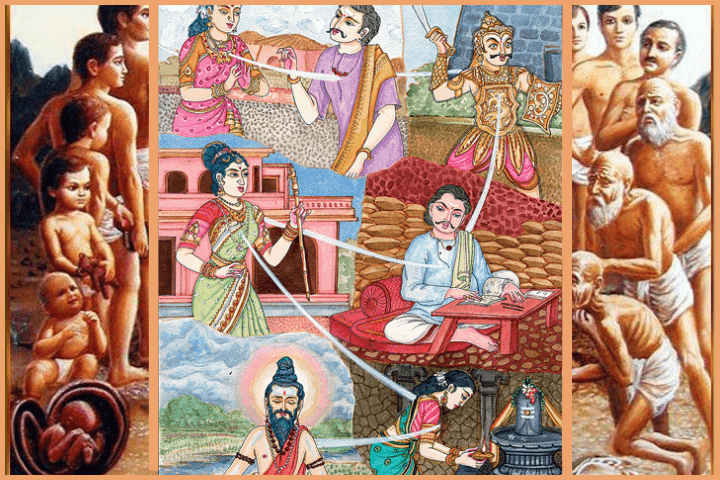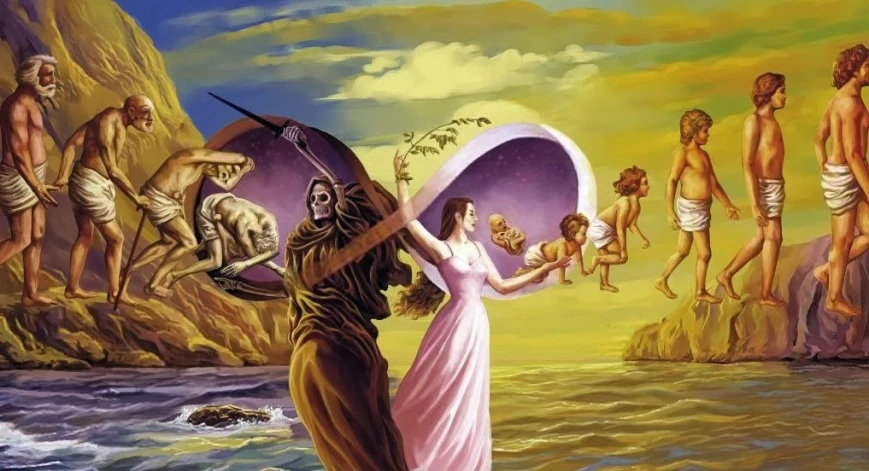Reincarnation and karma are two interlinked concepts that explain the cycle of birth, death, and rebirth. Rooted in spiritual traditions like Hinduism, Buddhism, and Jainism, these principles describe how one’s actions shape future experiences and determine the circumstances of their rebirth. The connection between reincarnation and karma offers insights into the continuity of the soul’s journey and the consequences of human actions.
What Is Reincarnation?
Reincarnation is the belief that the soul undergoes a continuous cycle of birth, death, and rebirth. When a person dies, their soul leaves the physical body and enters another form. This new form could be human, animal, or even celestial, depending on the accumulated karma from previous lifetimes.

According to Hindu philosophy, the soul (atman) is eternal and indestructible. It merely changes bodies, much like a person changes clothes. The Bhagavad Gita explains this concept by stating, “Just as a person discards worn-out clothes and puts on new ones, the soul discards worn-out bodies and takes on new ones.”
The soul, composed of subtle energy, carries impressions, desires, and unresolved karma from past lives. These karmic imprints influence the circumstances of the next incarnation, such as the environment, family, and life challenges. During the soul’s journey, it evolves spiritually, gaining wisdom through multiple lifetimes.
In Hinduism, it is believed that the soul exists beyond the physical body, residing in subtle realms (lokas) between incarnations. In the astral plane, the soul continues its existence in an ethereal form, processing its experiences before reincarnating. This period allows for reflection and spiritual growth.
Understanding Karma
Karma is the law of cause and effect, which governs the consequences of one’s actions. The Sanskrit term “karma” means “deed” or “action.” In spiritual philosophy, karma goes beyond mere actions it includes thoughts, intentions, and desires. Every action, whether good or bad, generates an energy that eventually returns to the individual.

The law of karma operates on the principle that:
- Good deeds lead to positive experiences in this life or future lives.
- Negative actions create suffering or challenges in subsequent incarnations.
Ancient yogis classified karma into three categories:
- Sanchita Karma: The accumulated karma from all past lifetimes that has not yet been resolved.
- Prarabdha Karma: The portion of sanchita karma that is being experienced in the current life.
- Kriyamana Karma: The karma being created through present actions, which will influence future lives.
The akashic memory, located in the higher chakras, records the soul’s impressions from all its lifetimes. These karmic imprints shape the experiences the soul undergoes in subsequent incarnations. Through dharma (righteous living) and sadhana (spiritual practice), individuals can soften negative karma and generate positive karma.
How Karma Influences Reincarnation
The relationship between karma and reincarnation is based on the principle of balance. Every action creates an energetic ripple that eventually returns to the individual, either in the same lifetime or in a future incarnation.
For example:
- A person who performs selfless service and kindness may be reborn into favorable circumstances.
- Conversely, someone who causes harm or suffering may face hardships in future lives.
The law of karma ensures that every soul faces the consequences of its actions, fostering spiritual evolution. Even seemingly unjust situations are seen as karmic lessons designed to promote growth and healing.
Additionally, karma operates not only on an individual level but also in group karma. People share collective karma with their family, community, or nation. The people who enter one’s life, whether as benefactors or adversaries, are believed to be karmically connected from past lives, playing a role in each other’s spiritual progress.
The Spiritual Purpose of Reincarnation
Reincarnation serves as a mechanism for spiritual evolution. The soul undergoes multiple incarnations to learn lessons, refine its character, and move closer to liberation (moksha). Through successive lifetimes, individuals face challenges that offer opportunities for personal growth and spiritual enlightenment.
Hindu philosophy explains that spiritual evolution occurs through:
- Experiencing dualities: Souls incarnate in both male and female bodies, wealthy and poor circumstances, and through various cultures and beliefs, acquiring a broad spectrum of experiences.
- Resolving karma: Each life presents karmic lessons. By facing and overcoming challenges with compassion and wisdom, the soul balances its karmic debts.
- Achieving self-realization: Through devotion, selfless service, and meditation, the soul gradually transcends the cycle of birth and death, attaining unity with the divine.
Karma, Free Will, and Divine Grace
While karma governs the outcomes of past actions, free will plays a crucial role in shaping future experiences. Individuals are not entirely bound by their karma they have the power to create new karma through their current choices. By acting with awareness, kindness, and integrity, they can influence their spiritual trajectory.
Moreover, divine grace can soften the impact of karma. According to Hindu philosophy, the Supreme Being and enlightened masters (Sat Gurus) can intervene, reducing the severity of karma or guiding the soul towards higher consciousness. A Sat Guru’s guidance helps seekers remain spiritually focused and dissolve karmic patterns more effectively.
The Path to Moksha: Freedom from Reincarnation
The ultimate goal of reincarnation is liberation (moksha), freedom from the cycle of birth, death, and rebirth. Moksha occurs when the soul has resolved all its karma and fully realizes its divine nature.
In Hinduism, this state of liberation is described as:
- Oneness with the Divine: The soul merges with the supreme consciousness, no longer bound by the limitations of the material world.
- Eternal bliss: The liberated soul experiences unending peace, joy, and unity with the divine essence.
- Transcendence of karma: With all karmic debts resolved, the soul is freed from the necessity of future incarnations.
Hindu philosophy teaches that moksha is not easily attained it requires lifetimes of spiritual effort, devotion, and self-purification. Only highly evolved souls achieve this final liberation.
The Eternal Cycle of Karma and Rebirth: A Path to Liberation
The connection between reincarnation and karma reveals the intricate workings of the soul’s journey through lifetimes. Karma governs the consequences of actions, while reincarnation offers the soul opportunities for growth and redemption. This cosmic cycle fosters spiritual evolution, enabling individuals to learn, heal, and ultimately attain liberation.
Understanding this connection encourages conscious living, guiding individuals to act with compassion, wisdom, and responsibility, knowing that their present actions shape their future incarnations.

